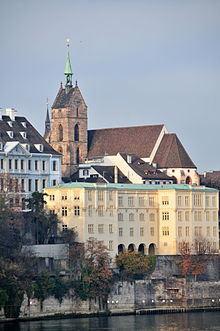Universität Basel | |
 | |
| Latin: Universitas Basiliensis[1] | |
| Type | Public |
|---|---|
| Established | 4 April 1460 |
| Budget | CHF 768 million (2020)[2] |
| President | Andrea Schenker-Wicki[3] |
Academic staff | 4,700[2] |
| Students | 13,139[2] |
| Location | Basel , Basel-City , Switzerland 47°33′31″N 07°35′00″E / 47.55861°N 7.58333°E |
| Colours | Mint, Red, Anthracite[4] |
| Affiliations | Utrecht Network, EUCOR |
| Website | unibas.ch |

The University of Basel (Latin: Universitas Basiliensis, German: Universität Basel) is a public research university in Basel, Switzerland. Founded on 4 April 1460, it is Switzerland's oldest university and among the world's oldest surviving universities. The university is traditionally counted among the leading institutions of higher learning in the country.[5]
The associated Basel University Library is the largest and among the most important libraries in Switzerland. The university hosts the faculties of theology, law, medicine, humanities and social sciences, science, psychology, and business and economics, as well as numerous cross-disciplinary subjects and institutes, such as the Biozentrum for biomedical research and the Institute for European Global Studies. In 2020, the university had 13,139 students and 378 professors. International students accounted for 27 percent of the student body.[6]
In its over 500-year history, the university has been home to Erasmus of Rotterdam, Paracelsus, Daniel Bernoulli, Leonhard Euler, Jacob Burckhardt, Friedrich Nietzsche, Tadeusz Reichstein, Karl Jaspers, Carl Gustav Jung, Karl Barth, and Jeanne Hersch. The institution is associated with ten Nobel laureates and two Presidents of the Swiss Confederation.[7]
- ^ Actes du Jubilé de 1909 (in Swiss French). Geneva, Switzerland: Georg Keck & Cie. 1910. ISBN 9781360078335.
- ^ a b c "University of Basel, Facts & Figures". University of Basel. Retrieved 15 March 2022.
- ^ "Die Rektorin". www.unibas.ch. Archived from the original on 28 April 2017. Retrieved 28 November 2017.
- ^ "Colors". www.unibas.ch. Retrieved 24 May 2023.
- ^ Universities, Swiss. "University of Basel". Swiss Universities Handbook – Top Universities in Switzerland. Archived from the original on 21 October 2020. Retrieved 7 April 2018.
- ^ "Herbstsemester 2020".
- ^
- "All Nobel Prizes". www.nobelprize.org. Retrieved 10 February 2018.
- Bundesrat, Der. "Bundespräsidenten". www.admin.ch (in German). Retrieved 10 February 2018.